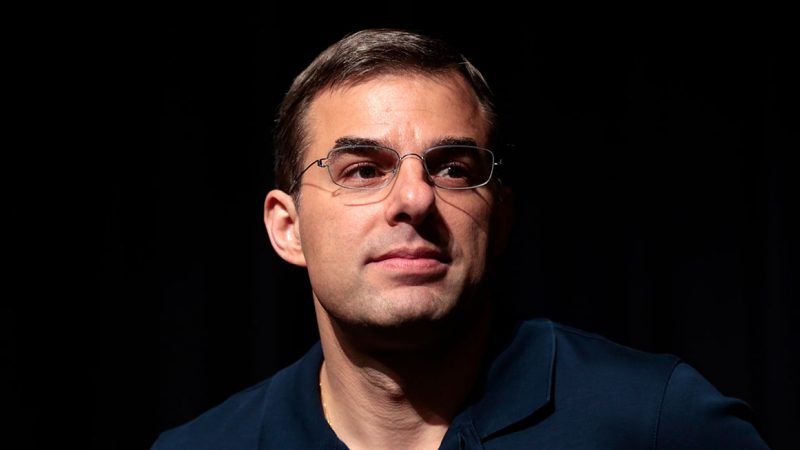Will Justin Amash Run for President as a Libertarian in 2020?

FreedomFest, a largely libertarian gathering in Las Vegas with a significant conservative presence, has been tacking in a noticeably Trumpian direction since the future president spoke there in 2015. So the latest iteration of the conference this July was an interesting backdrop to speculation that newly independent Michigan Rep. Justin Amash might seek to challenge a chief executive against whom he was the only Republican to back impeachment proceedings.
"I respect what Justin has done," said his best friend in Congress, Rep. Thomas Massie (R–Ky.), while sitting on a FreedomFest panel with Amash and Sen. Mike Lee (R–Utah). "But what I say is, if you read the Republican platform, there's really nothing wrong with it, if you're for smaller government and for liberty and support the Constitution. The problem is, if you follow the Republican platform as a Republican when you get to D.C., you will be reviled for it."
Massie, a four-term libertarian-leaner, has experienced what it's like to be reviled by your own team. In early July, the Louisville Courier-Journal reported that Massie will likely face a primary challenge backed by national Republican leaders who are angry at his ideological obstinance.
"These two guys have really tried to reform [the GOP] from within," Amash said from the stage. "I think we're getting to a point where it's clear to all of us that this is an insurmountable challenge. And that's why I decided I needed to become an independent, and try to serve my community a different way, and try to set an example."
Conversations about whether Amash might seek the Libertarian Party presidential nomination have been roiling the movement all year. When he first came out for impeachment in late May, leading to yet another burst of speculation, several already-declared L.P. presidential candidates more or less agreed with anarchist activist Adam Kokesh that such a move would be "amazing." By mid-July, however, that field of comparative unknowns had grown visibly tired of the topic.
"I feel like I talk about Justin Amash more than I do about myself," candidate Kim Ruff groused at a Massachusetts state convention presidential debate that I moderated in mid-July. Neither Ruff (who won an informal post-debate straw poll) nor any of the other participating candidates—Kokesh, former party vice-chairman Arvin Vohra, New Hampshire state Rep. Max Abramson, and Dan "Taxation Is Theft" Behrman—said they would support Amash over their competitors should he decide to run.
"We cannot elect or nominate a former Republican…for the fourth cycle in a row. I just think that would set the party back so far," Kokesh said. "I would really, enthusiastically welcome Amash to the race, but I would be more thrilled to support and see anybody on this stage beating him."
The existing Libertarian contenders may grumble about party leadership openly rooting for Amash to take the plunge, but L.P. National Chair Nicholas Sarwark is unapologetic. "We have the best opportunity to pick the best nominee if there's good competition in the game," Sarwark told me at FreedomFest. "I don't have a favorite, but I'm going to be welcoming to new people."
Amash has until May 21, 2020—when the L.P. national convention kicks off—to make up his mind. What will drive the decision? By "thinking about where I can use my skills and influence best," Amash told Reason's Nick Gillespie. "And I feel like if I can be most effective on the national stage spreading the message of liberty and the message of respect and love, then that's what I do."
In many respects, the choice looks grim. In one best-case scenario, Amash survives a three-way race for re-election to the U.S. House despite Michigan's straight-ticket ballot device (which allows someone to vote for an entire political-party slate by checking a single box) and despite the two major parties dumping millions into a winnable seat. A second optimistic outcome would be for him to labor mightily, in much more adverse circumstances, to top Gary Johnson's record-shattering 2016 result of just 3.27 percent of the presidential vote.
Five years ago, libertarians were clucking about their resurging fortunes in American politics. Now, one of the last federally elected officials to unapologetically fly that flag finds himself alone and potentially endangered.


Show Comments (96)